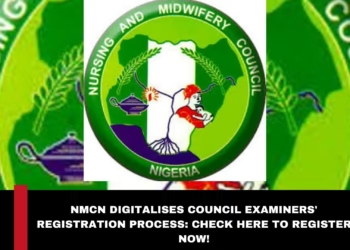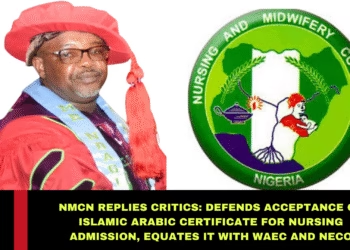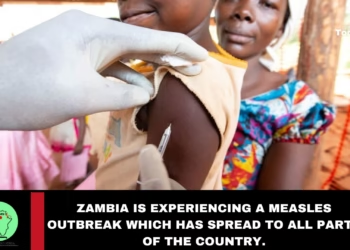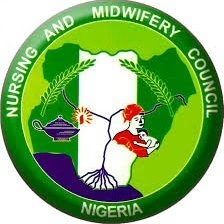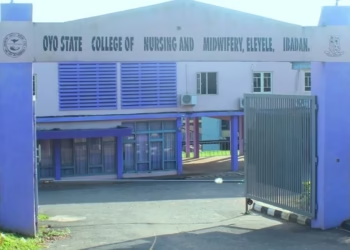NMCN Approves SAISSCE for Nursing Admissions: Nigerian Nurses Express Deep Concern Over Standards and Global Relevance
News Report
By Fellow Nurses Africa, 16th April 2025.
A wave of mixed reactions has swept through Nigeria’s nursing community following a circular issued by the Nursing and Midwifery Council of Nigeria (NMCN) approving the Senior Arabic and Islamic Secondary School Certificate Examination (SAISSCE) as an acceptable qualification for entry into nursing programmes.
Signed by the Acting Registrar/CEO, Ndagri Hassan, the directive reaffirms that candidates with SAISSCE are to be granted admission opportunities in nursing institutions, on par with applicants holding WAEC, NECO, and NABTEB certificates.
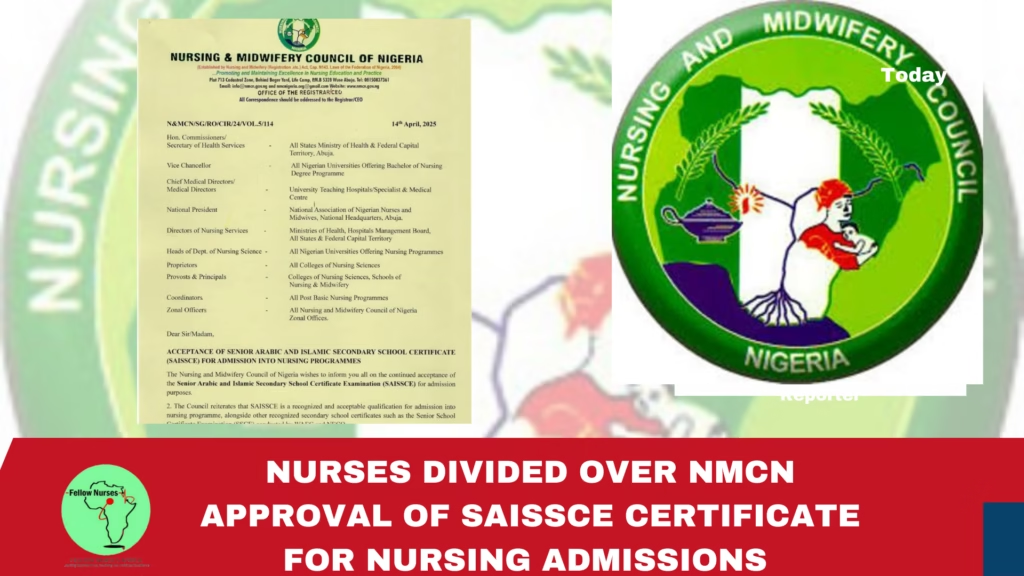
However, this decision has sparked widespread concern among nurses, educators, and health professionals across digital forums and professional platforms, many of whom fear the implications for educational quality, international compatibility, and professional integrity.
“This Is a Science-Based Profession, Not a Religious Platform”
Health professionals from various regions have openly questioned the academic and scientific grounding of the SAISSCE. They argue that nursing education requires a strong foundation in sciences—subjects like Biology, Chemistry, Physics, Mathematics, and English Language, which are core prerequisites globally.
“Let’s not reduce nursing to a testing ground for policies that wouldn’t even be attempted in medicine or pharmacy,” a senior educator commented.
“This decision lacks alignment with international expectations for nursing education. It’s not just about local politics—it’s about global competitiveness.”
Subject Requirements and Global Pathways Under Scrutiny
Others raised concerns about the structure of the SAISSCE curriculum and its readiness to support scientific learning.
“Has NBAIS modified its curriculum to include core sciences like NABTEB did?” one nurse asked.
“If not, how do we expect students to survive in an intensive science-driven field like nursing?”
Several contributors stressed that even with globally recognized O’Level results, Nigerian-trained nurses still need to pass IELTS and other international assessments to work abroad. They fear that introducing less recognized certificates could make things worse.
“How do we explain this certificate at embassies or in postgraduate applications abroad?” one professional questioned.
“We’re setting students up to be rejected internationally.”
Religion, Politics, and the Integrity of the Profession
The religious identity associated with SAISSCE—being rooted in Islamic education—has intensified the debate. Many expressed fears that this move could open the doors to more faith-based educational certifications, which would shift nursing away from its secular, scientific foundation.
“Tomorrow we’ll have Christian School Certificates. The next day, Traditional Herbal Nursing Certificates. Where does it end?” one comment read.
Others called out the political undertones in the decision.
“Let’s be honest: this has more to do with power and regional influence than educational merit. We’re witnessing a strategic shift, and it didn’t start with nursing by accident.”
Not All Are Opposed: Some Defend the Council’s Decision
On the other hand, several voices applauded the decision, pointing out that NBAIS is a recognized federal body that has existed since 1960, and that many Islamic schools today offer a hybrid curriculum that includes standard science subjects.
“Let’s not create chaos over the mention of Islam. Many of these schools produce brilliant students who pass UTME and meet core subject requirements,” one nurse argued.
Call to Action: Time to Re-Evaluate and Realign
As professionals committed to evidence-based care and excellence, nurses must hold the NMCN accountable to the principles of meritocracy, transparency, and global standards. Decisions about entry qualifications into the nursing profession must be science-driven, inclusive, and universally accepted.
This is not about religion or politics—it is about the future of nursing education, the credibility of our graduates, and the respect of the Nigerian nurse on the global stage.
We call on stakeholders, institutions, and the Council itself to:
- Clarify the subject structure of SAISSCE and its alignment with science education
- Ensure all approved entry certificates meet international benchmarks
- Engage nursing leaders, educators, and associations in policy decisions
- Preserve the professional integrity and international image of Nigerian nursing
Nursing is not a cultural or political tool—it is a vital, science-based profession. Let’s protect it, together.

